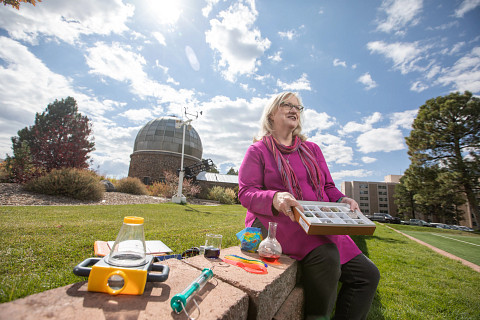Many elementary education majors graduate from teacher preparation programs with incomplete knowledge of science content and limited experience with teaching science in ways that are proven to be effective for elementary students.
In fact, the most recent National Survey of Science and Mathematics Education found that only 23 percent of elementary teachers reported feeling “very well prepared” to support the development of conceptual understanding of science ideas by their students. As a result, elementary school students may not be getting the science education they need to prepare them for the challenges of the 21st century.
The National Science Foundation (NSF) recently awarded Marti Canipe, assistant professor in Northern Arizona University’s Department of Teaching and Learning, a $296,000 grant for the project, “Improving Science Content Knowledge of Undergraduate Elementary Education Majors through Phenomenon-based Science Courses.”
This three-year project will address this knowledge and skills gap by developing and assessing science courses for elementary education majors that not only target the breadth of science content knowledge needed to teach elementary science but also model effective pedagogical practices.
The science courses will employ phenomenon-based instruction methods, which focus on activities that engage students in a range of scientific practices in order to develop evidence-based explanations. For example, to explain why muffins rise in the oven (the phenomenon), students need to understand ideas related to the structure and properties of matter, chemical reactions and energy. Education research shows that using real-life phenomena to teach science, rather than the traditional model of education that relies on rote memorization and recall of facts, is much more effective.
“Unlike secondary science teachers who typically specialize in a particular content area, elementary teachers are expected to be generalists, responsible for teaching all subjects, including science,” Canipe said. “Additionally, elementary science at each grade level consists of a mixture of topics in the life, earth/space and physical sciences. Elementary teachers may also change grade levels from one year to the next, making them responsible for teaching a different set of science topics. A well-prepared elementary teacher needs a broad understanding of science across all disciplines in addition to an understanding of effective models for teaching science to elementary students.”
Canipe’s research will contribute to the field’s understanding of how prospective elementary teachers develop deep science content knowledge, building on previous research examining the relationship between science content courses for elementary teachers and their confidence, attitudes and self-efficacy beliefs.
She will collaborate on the project with associate professor Ron Gray of NAU’s Center for Science Teaching and Learning. Advisory board members are Christina Krist of the University of Illinois, Christina Schwarz of Michigan State University, Melissa Braaten of the University of Colorado and Kristin Gunckel of the University of Arizona. Stefani Chase, a doctoral student in NAU’s Curriculum and Instruction Ph.D. program, will join Canipe on the project.
The science course materials the team develops will be made publicly available. “Teacher educators will be free to adopt and/or adapt the materials in ways that fit their context,” Canipe said, “and the materials can be adapted for use in professional development settings for practicing teachers.”
This project has the potential to significantly impact science instruction for undergraduate elementary education majors and their future elementary school students.
“The research and education outcomes for this project have the potential to spread far beyond the context of one elementary education program and improve elementary science teacher education more broadly, which in turn has the potential to impact many elementary students of diverse backgrounds in the coming years, providing a foundation on which they can build scientific understandings throughout their education,” she said.
Canipe, who was an instructor and grad student at the University of Arizona before joining NAU in 2016, taught third through eighth grade science for 12years in North Carolina. She served as an Albert Einstein Distinguished Educator Fellow in the Office of Polar Programs at the NSF, where she worked to help polar scientists connect with K-12 classrooms by developing resources for teachers and scientists to help bring their scientific research into schools. Her primary research interest is elementary teachers’ identities as teachers of science.
Kerry Bennett | Office of the Vice President for Research




